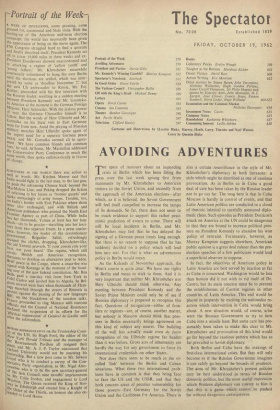AVOIDING ADVENTURES
rrNE spate of rumours about an impending As the Kalends of November approach, the West's course is quite clear. We have our rights in Berlin and mean to stick to them. And it is very important that neither Mr. Khrushchev nor Herr Ulbricht should think otherwise. Any meeting between President Kennedy and the Soviet Prime Minister could only be of use if Russian diplomacy is prepared to recognise this fact. Questions of recognition—either of fron- tiers or regimes—are, of course, another matter, but nobody in Moscow should think that pres- sure in Berlin necessarily brings agreement on this kind of subject any nearer. The building of the wall has actually made even de facto recognition of the Ulbricht regime far harder. than it was before. Gross acts of inhumanity are hardly the way for any government to force its international credentials on other States.
Nor does there seem to be much in the so- called 'link' between the Berlin and Cuban situations. What these two international prob- lems have in common is that they bring face to face the US and the USSR, and that they both concern areas of peculiar vulnerability for those powers—East Germany for the Soviet Union and the Caribbean f"r America. There is
also a certain resemblance in the style of Mr. Khrushchev's diplomacy in both instances: a style which might be described as one of cautious provocation. As in Berlin so in Cuba a good deal of care has been taken by the Russian leader not to go too far. The snag here is that in Cuba Moscow is hardly in control of events, and that Latin American politics are conducted in a cloud of rhetoric inimical to carefully measured diplo- matic chess. Such episodes as President Dorticos's attack on America at the UN could be dangerous in that they are bound to increase political pres- sure on President Kennedy to abandon his wise policy of restraint. Fortunately, however, as Murray Kempton suggests elsewhere, American public opinion is a great deal calmer than the pre- election speeches of a few politicians would lead a superficial observer to suppose.
In fact, the objectives of American policy in Latin America are best served by inaction as far as Cuba is concerned. Washington would be less than human did it not wish to rid itself of Dr. Castro, but its main concern must be to prevent the establishment of Castrist regimes in other countries of Latin America. This end would be placed in jeopardy by exciting the nationalist re- action which intervention in Cuba would bring about. A new situation would, of course, arise were the Russian Government to try to turn Cuba into a missile base. But some care has pre- sumably been taken to make this clear to Mr. Khrushchev and provocation of this kind would go far beyond the cautious pattern which has so far prevailed in Soviet diplomacy: .Both Berlin and Cuba have the makings of first-class international crises. But they will only become so if the Rtissian Government imagines it can safely go beyond the bounds of prudence, The aims of Mr. Khrushchev's present policies may be best understood in terms of Russian domestic politics, but the most useful impression which Western diplomacy can convey to him is that this is a game which cannot be pushed far without dangerous consequences.














































 Previous page
Previous page